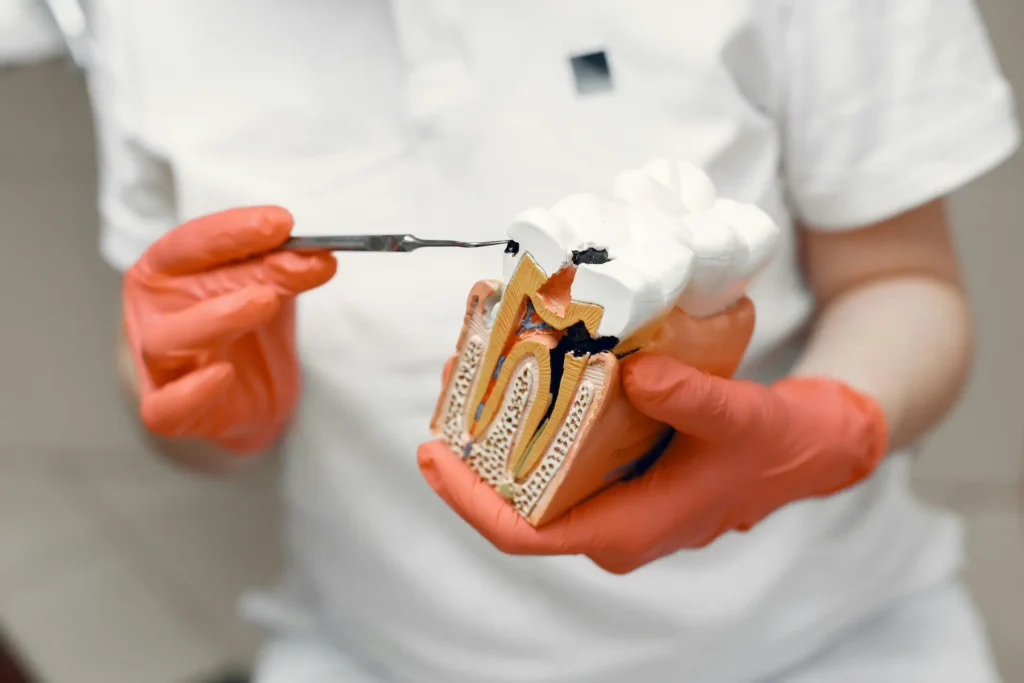Can You Reverse a Cavity? Separating Facts from Myths

Early enamel decay can be reversed, but true cavities cannot. Fluoride, oral hygiene, and diet changes support remineralization and help stop early damage. If a cavity reaches dentin, only a dentist can treat it—Aleriom can help guide you to trusted care.
Many people hope that a cavity can simply “heal itself”, and sometimes, early tooth decay actually can be stopped and reversed to a certain extent. But other times, once a cavity has gone too deep, no amount of brushing or fluoride will restore the tooth, and you’ll need a dentist to treat it. Understanding the difference can save you pain, money, and bigger dental problems down the line.
In this article, we’ll break down what science says about reversing cavities, what’s truly possible, and which daily habits help protect your enamel. Whether you’re trying to avoid your first filling or prevent future decay, this guide gives you clear, evidence-based answers.
What Can (and Can’t) Be Reversed?
Early decay: Reversible
Before a cavity forms, tooth enamel begins to demineralize, a process where minerals like calcium and phosphate are pulled out of the enamel. At this stage you might see:
- White spots on the tooth
- Slight roughness
- Increased sensitivity
- No visible hole yet
If decay is still in the enamel, you can often stop it and help minerals return to the tooth through remineralization (we’ll explain what this entails further on).
True cavity: Not reversible
Once decay reaches the dentin, the softer second layer under the enamel, it becomes a true cavity. At this point:
- A hole forms
- Bacteria spread faster
- Pain or sensitivity worsens
No home remedy or toothpaste can heal dentin decay. A dentist must remove the decay and restore the tooth with a filling, inlay, or crown, depending on how extensive it is.
How Remineralization Works
Your mouth is constantly balancing demineralization and remineralization. Remineralization happens when:
- The pH in your mouth rises to a neutral level
- Saliva brings calcium and phosphate back to the enamel
- Fluoride strengthens the enamel and creates fluorapatite (a harder, more decay-resistant material)
This is why fluoride toothpaste, and in some countries, fluoride in water, is widely recommended by major dental organizations. It’s one of the most effective tools in preventing cavities.
Habits That Help Reverse Early Decay
1. Use fluoride daily
Fluoride toothpaste and mouth rinses strengthen enamel and help repair early damage. Despite online conspiracy theories, fluoride is safe when used as recommended and supported by decades of research.
2. Reduce sugar frequency, not just quantity
Every time you sip or snack on sugar, bacteria release acids that attack enamel for about 20–30 minutes. Limiting sugary snacks, and drinking plenty of water after eating, helps keep enamel stronger.
3. Brush twice a day, floss once a day
Plaque bacteria fuel the decay process. A clean mouth gives enamel the chance to heal naturally.
4. Chew sugar-free gum
Xylitol helps neutralize acids, stimulates saliva, and supports remineralization.
5. Maintain regular dental checkups
Dentists can spot early lesions long before you can. Identifying problems early often means avoiding fillings entirely. If you’re not sure where to start, check out our blog article.
Can Any Products “Heal” a Cavity?
You may see products claiming to “heal cavities naturally,” but remember:
- They can support remineralization,
- They cannot rebuild lost tooth structure.
If a cavity has already formed, only a dentist can restore the tooth. Don’t trust any products that say they can reverse a cavity, it isn’t backed up by science and the product may not be regulated.
When You Should See a Dentist
Get a professional evaluation if you notice:
- Pain or sensitivity that lasts
- Dark spots or holes
- A rough area on a tooth
- Food frequently getting stuck in one spot
Even small cavities worsen quickly once they reach dentin. Treating them early keeps procedures simpler and more affordable.
How Aleriom Helps Patients Catch Problems Early
For patients traveling for dental care, Aleriom helps ensure your treatment is safe, accurate, and based on real diagnostic information. We help you:
- Get high-quality dental scans
- Receive clear explanations of what can be reversed and what needs treatment
- Compare options like fillings, onlays, or veneers
- Coordinate travel and appointments with trusted dental providers in Colombia
We make it easier to get expert guidance before small issues become big ones. If you’re ready to take the next step, send us a message, we’ll be happy to help you get the dental care you need affordably.
FAQs
Can Aleriom help me understand whether my cavity can be reversed or if I need treatment?
Yes. At Aleriom, we work directly with trusted dentists who review your case, X-rays, and concerns to determine whether your tooth is still in the early demineralization stage or if you already have a true cavity that needs a filling. Our team helps you get clear answers before you travel so there are no surprises during your appointment.
If I travel to Colombia with Aleriom, can I get preventive treatments like fluoride varnish or sealants?
Absolutely. Many clients come not only for restorative care but also for prevention. Aleriom’s partner clinics offer fluoride applications, sealants, deep cleanings, and remineralization products to help stop early decay. If you’re trying to prevent a small issue from turning into a filling, we make sure you’re scheduled with the right specialist.
What if my cavity is too advanced to reverse, can Aleriom guide me on the best treatment option?
Yes. If remineralization is no longer possible, our dentists will explain the most effective, affordable treatment options, whether that’s a filling, inlay/onlay, or crown. Aleriom helps compare prices, plan your visit, and coordinate all appointments so you know exactly what to expect and can choose the option that fits your needs and budget.
